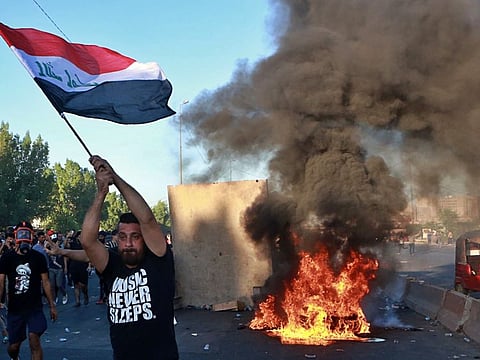Iraq should enact reforms to end protests
US shouldn’t try to save Abdul Mahdi and make aid conditional on progress in Iraq

The most charitable thing to be said for Prime Minister Adel Abdul Mahdi’s response to the protests wracking Iraq is that it was ill-advised. But perhaps this was to be expected, since one of his senior advisers has declared that “there is no real answer” to the country’s problems.
Abdul Mahdi, a lugubrious figure in the best of times, delivered an especially dismal performance in the most important speech of his career on Friday, after his security forces had killed several dozen Iraqi protesters. He offered no answers, only mealy-mouthed platitudes about listening to the people’s demands — and then cautioned that there was “no magic solution.”
This is unlikely to satisfy the protesters, who are asking him to do his job, not conjure up any tricks. Iraqis are fed up with the corruption and ineptitude that characterise their government, with the political impasse that defines their Parliament, with the growing influence of Iran in all aspects of the state, and with Mahdi’s inability to do anything about anything.
The prime minister’s response to days of increasingly angry protests has been to unleash his security forces, impose curfews and try to block the internet — the classic tells of a leader who has lost control of the situation. His government has also shut down its border with Iran, just as millions of Iranians were about to make their annual pilgrimage to the Iraqi shrine cities of Najaf and Karbala.
If Abdul Mahdi is forced out by Parliament, the US should allow the politics in Baghdad to play out to the satisfaction of Iraqis.Bobby Ghosh, Bloomberg columnist
The crackdown on protesters cannot be sustained. Abdul Mahdi is a political weakling, and was only given his job because no party was able to form a governing coalition. If the violence continues, the parties that saw him as a useful compromise candidate will find him just as useful as a sacrificial lamb.
This would raise alarm in Washington, where anxiety about Abdul Mahdi being replaced by a more pro-Iran figure is bipartisan. Iraq is central to the Trump administration’s Middle East policy, a frontline state in the confrontation with the Islamic Republic. And Abdul Mahdi is seen as more malleable to American persuasion than most of the prominent figures in Parliament.
The administration might therefore be tempted to intervene in the political morass that is Baghdad, to prop up the prime minister. That would be a grievous mistake.
For one thing, Iraqis are just as opposed to American interference as to Iranian influence; in their chants, protesters condemn both in the same breath. For another, they are demonstrably more opposed than Washington to a prime minister who bows to Tehran. Many of the protests are taking place in the southern cities of Iraq, home to the country’s Shiite majority — a group assumed by US policymakers to be disposed to favour their co-religionists in Iran. But the southern cities were where the strongest anti-Iran protests took place in the summer of 2018, which effectively ended the re-election prospects of Abdul Mahdi’s predecessor, Haider Al Abadi — another Shiite.
Washington backed Al Abadi in the political horse-trading that followed the May 2018 election. It didn’t succeed then, and is unlikely to do much better if it tries to save Mahdi.
Instead, the Trump administration should recognise that Abdul Mahdi is patently the wrong man to be running Iraq. Rather than protect him, it should use its leverage with the prime minister to demand the very reforms the protesters are demanding — and make American military and financial aid conditional on progress in achieving them.
And if Abdul Mahdi is forced out by Parliament, the US should allow the politics in Baghdad to play out to the satisfaction of Iraqis. American interests have never been more closely aligned with theirs.
— Bloomberg
Bobby Ghosh is a columnist and member of the Bloomberg Opinion editorial board.


